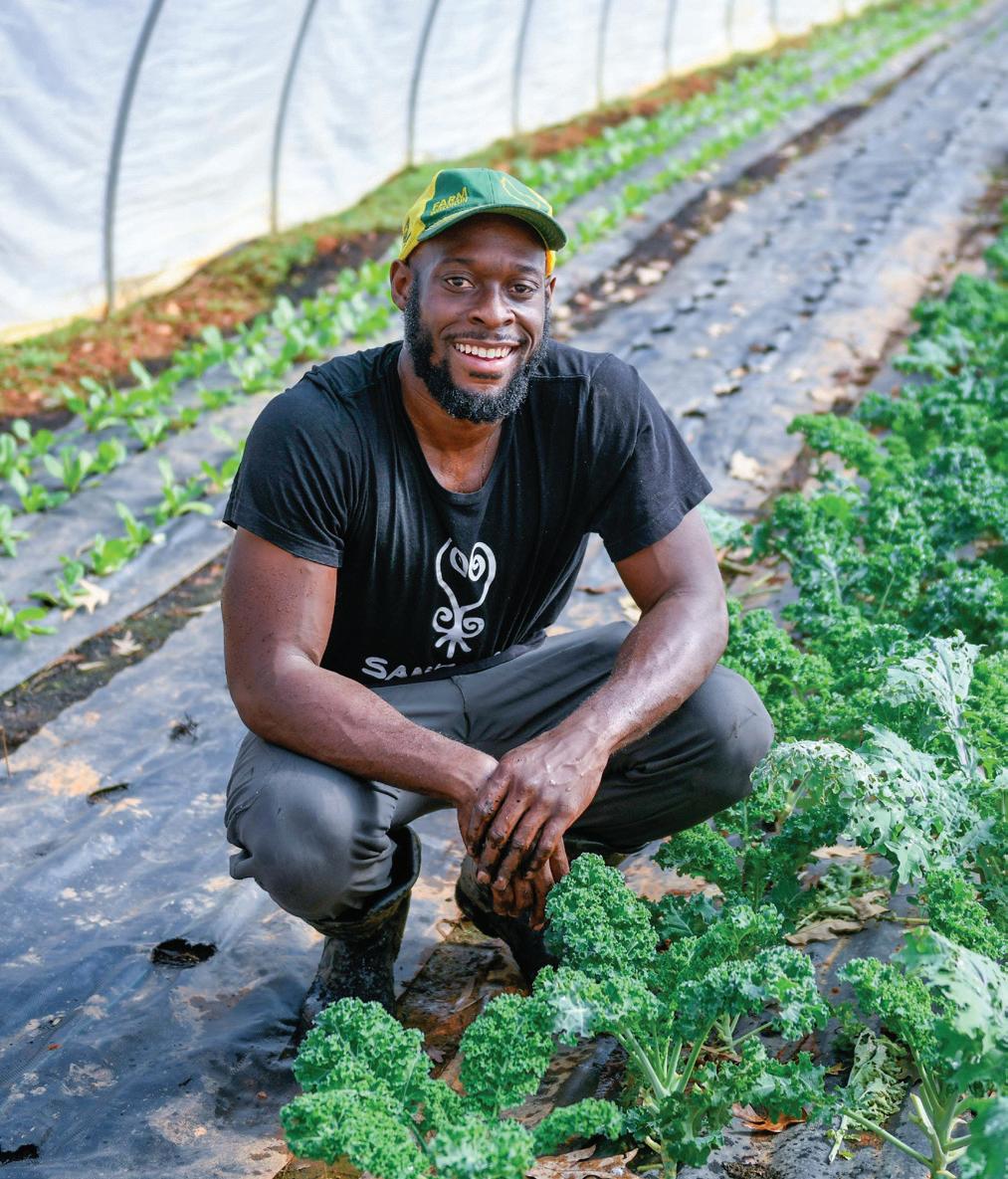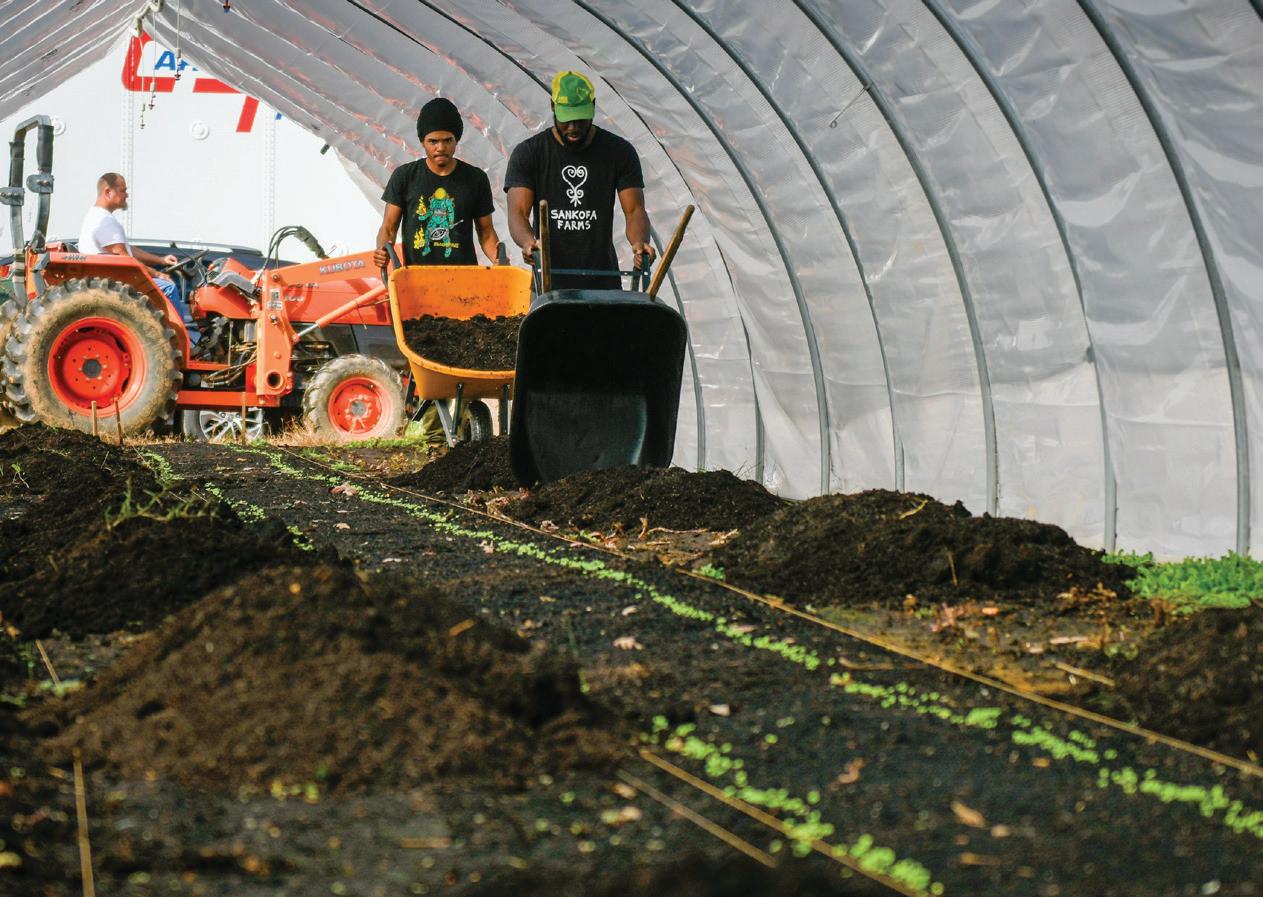
3 minute read
FARMER, EDUCATOR, CHANGE AGENT
ALUMNUS SOWS SEEDS IN LOCAL FOOD DESERTS
Bell realized that for many communities in the area, there was not only an income gap, but also a food gap that he wanted to help fill. He also realized that students from these communities would benefit from having access to a space that caters specifically to them, that honors their experiences and their needs in a way few other institutions can.
“We are defying the odds by introducing a sustainable farming business model centered around issues that directly affect African Americans,” Bell said. “The farm is the engine to rebuild our community.”
The farm started with a few beehives. This year, the 36th beehive was installed, and there are four “caterpillar tunnels” that provide the means to grow year-round crops. Sankofa also produces fresh eggs, dehydrated chips, and of course, honey.
Cardinal Gibbons graduate Kamal Bell ‘09 is well known locally as an educator and farmer whose tireless work delivers welcome support to local communities in and around Durham.
Bell is unique in that his particular campaign for social change begins with honeybees, and flows steadily from Sankofa Farms to minority neighborhoods in an effort to provide nutritious options for those affected by food desertscommunities that experience a lack of access to healthy foods.
Prior to starting his farm in 2016, Bell taught biotechnology in Durham. He and a group of students wanted to take an unused patch of school grounds and convert it to a garden, but they were initially denied permission. This experience, coupled with what he knew about local food insecurity, led him to buy some land and found Sankofa Farms.
When we spoke to Bell in late October, fennel was about to go into the ground, along with lettuce mixes and a lot of spinach. Dismissing carrots as less hearty and radishes as too labor-intensive (they’re hard to clean), Bell is clearly learning by trial and error what grows well with the current setup, even through the winter.
“We’re going to be producing a whole lot of food here; I’m just slowly gearing my mind toward the production piece of the farm,” he said.
Thanks to the Sankofa Farms Agricultural Academy, Bell doesn’t farm alone. The Academy is one of Bell’s major achievements. This program targets African Americans between the ages of 11 to 17, and its goal is to introduce STEM concepts and careers using agriculture as a pathway.
The academic program doesn’t follow a traditional format. Instead, students who are interested come out to the farm three times a week, and the group figures out how to work the farm together, alongside Bell.
Because of its flexible structure, Bell can hone in on the students’ needs and respond to them with education and mentorship. Students benefit from the camaraderie of working together and “seeing a black man that looks like them do something constructive that doesn’t involve entertainment,” Bell said.
The students also appreciate the presence and practicality required to work the land.
“Farming is a very modest thing. You’re not going to see many farmers driving around in a Mercedes…If we did want to get these things, we could,” said Bell, but the goal of the program is to do what one can with what one has, which also resonates with the participants.
Those who come out with an open mind and embrace the experience really enjoy it and seem to relax; they have time to think things through and feel comfortable in their skin.
Creating that safe space on the farm is of paramount importance to Bell, who believes that every black student who is a minority in their daily environment struggles in some way with their identity and sense of belonging.
“The only thing that really benefits black people is us having spaces that cater to our own needs,” Bell said, noting that the formative years during high school are especially fraught with challenges for people of color.
“Other kids know who they are, because they are presented with images that look like them and cater to them, and there’s a whole system that caters to them, but rightfully so - that’s what you do when you have resources; you build something that caters to you.” Bell said.
His goal, then, is not just about bringing healthy options to food deserts; it’s also about cultivating opportunities that are shaped by experiences and perspectives students can relate to directly.
Once students are in the program, they tend to stay in communication with Bell - even the ones who quit.
“You can’t really age out of Sankofa; once you’re in it, you’ll always be in it and always have access to me and the resources that come through the farm. That’s [the student’s] choice.”
Unsurprisingly, Bell has received numerous awards and recognition for his innovative work in agriculture with at-risk youth. And as both his program and farm grow, Bell plans to expand his outreach to future students, as well.


“I’m here to support the black students at Gibbons in any capacity,” Bell said. “I’m here to offer a diverse perspective to the black student population.”
Interested students are encouraged to contact Bell at sankofafarmsllc@gmail.com.
Learn more about Sankofa Farms and its mission at sankofafarms.com/about









